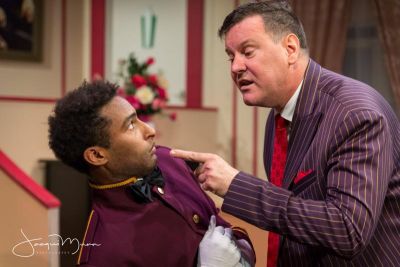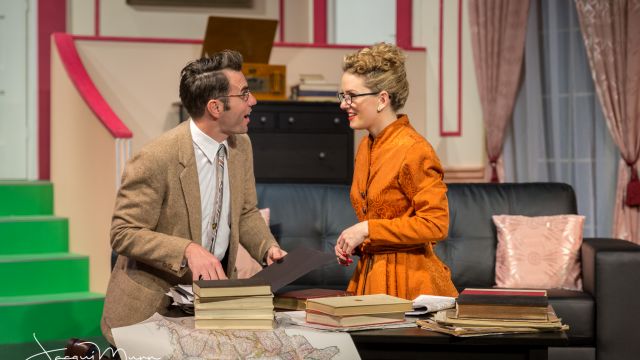Born Yesterday
Whilst the stage play and later film, Born Yesterday, were written and set in post war America in 1946, Independent Theatre’s latest production reminds us how up to date the concept of questionable political and business partnerships remains. In the era of the “Me Too” campaign the misogyny and mobster-style brutality of the story is also poignant and highly relevant.
The stage play and film of Born Yesterday were both written by Garson Kanin. It is the story of an uneducated, unwitting young woman, Billie Dawn, and an uncouth, older, wealthy junkyard tycoon, Harry Brock, who go to Washington to try to "buy" a Congressman, thus gaining access to the abundant scrap metal of post war Europe.
With a bitter, corrupt lawyer, and a “tame” Congressman in tow, Harry hires an idealistic, principled journalist, Paul Verrall, to educate Billie and make her a more suitable asset in Washington. In the process, she begins to question how Harry has been using her; especially her position as a silent partner who owns 126 of her own junkyards and has signed off hundreds of documents, completely unread.
For the Independent Theatre production, the Goodwood Institute stage is well set up for the two-level, luxury Presidential suite where all of the story is set. Attention to 1930’s Deco detail and colour is included. Possibly because of war privation, with the exception of a very modern looking couch and coffee table, this luxury suite has not been updated to the late 1940’s. To deal with the social censure of the time, the top level cleverly includes a bedroom each for Billie and Harry.
 Undoubtedly, this is Madeleine Herd’s show. She has modelled herself on the legendary Judy Holliday, who won an Oscar for this role, perfecting a mix of a coarse, uneducated showgirl, a vulnerable girl whose family memories are precious and an increasingly clever woman who has no taste for bullying and corruption. Herd uses her vocal register effectively, introducing subtle nuance and strategically reshapes her movement and stage placement as her character changes and grows. Despite her first entry in a stretch lycra dress, Herd uses Billie’s showgirl carriage to wear clothing beautifully. She looks exquisite in the period-appropriate wardrobe that Sandra Davis has created. Herd plants some of the best comedy lines and the conversation-free gin rummy scene is a triumph.
Undoubtedly, this is Madeleine Herd’s show. She has modelled herself on the legendary Judy Holliday, who won an Oscar for this role, perfecting a mix of a coarse, uneducated showgirl, a vulnerable girl whose family memories are precious and an increasingly clever woman who has no taste for bullying and corruption. Herd uses her vocal register effectively, introducing subtle nuance and strategically reshapes her movement and stage placement as her character changes and grows. Despite her first entry in a stretch lycra dress, Herd uses Billie’s showgirl carriage to wear clothing beautifully. She looks exquisite in the period-appropriate wardrobe that Sandra Davis has created. Herd plants some of the best comedy lines and the conversation-free gin rummy scene is a triumph.
Stuart Pearce as Brock is presented as big, very loud and a bully and on opening night struggled, perhaps because of the writing, to move from one dimension. Portrayal of the character as a buffoon makes it hard to empathise with him, or to understand how someone so obtuse has made the millions that he constantly refers to.
Jonathan Johnston plays Paul Verrall, the foil for the bully, and romantic lead, as a principled young man who is passionate about the importance of “for the people, of the people and by the people” in American democracy. Fairly quickly, Verrall also becomes bewitched by Billie, and it is his faith and tutoring that lifts her from chorus girl to tycoon. His performance is measured and believable, particularly in the third act.
David Roach as lawyer Ed Devery captures the role of the wheeling, dealing, corrupt Washington lawyer with aplomb. His subtle gestures, including frequently pouring himself drinks, highlighting his own struggles, his warmth and caring with Billie and his strategic use of the stage, reminds us why he is a well-respected, seasoned actor.
 The supporting roles have little impact on the story other than interrupting the machinations of the main four characters. Bronwyn Ruciak, in a 1950’s style costume and David Rapkin in a suit that evokes the 1940’s, are Senator and Mrs Hedges. They appear distressed and perpetually anxious. The political corruption is not strongly evident in the Senator’s role until the third act and rather, we see Ed Devery as the “kingmaker” in Washington.
The supporting roles have little impact on the story other than interrupting the machinations of the main four characters. Bronwyn Ruciak, in a 1950’s style costume and David Rapkin in a suit that evokes the 1940’s, are Senator and Mrs Hedges. They appear distressed and perpetually anxious. The political corruption is not strongly evident in the Senator’s role until the third act and rather, we see Ed Devery as the “kingmaker” in Washington.
The Bell Captain played by Thomas Tessema, and the maid, played by Jenna Bezuidenhout, provide some light relief and they also become victims of Brock’s domineering bullying. As cousin Eddie Brock, Greg Janzow is somewhat of a gangster’s sidekick caricature, but Janzow seizes the opportunity in the last act to add to both the comedy and message of the play.
Born Yesterday is billed as a comedy, and played in parts like a farce. Rather, it is the poignant tale of the “coming of age” of a woman who finds her metier. It is also an unapologetic reminder that in international politics we live in changing, challenging “interesting times”.
Jude Hines
Photographer: Jacqui Munn
Subscribe to our E-Newsletter, buy our latest print edition or find a Performing Arts book at Book Nook.

